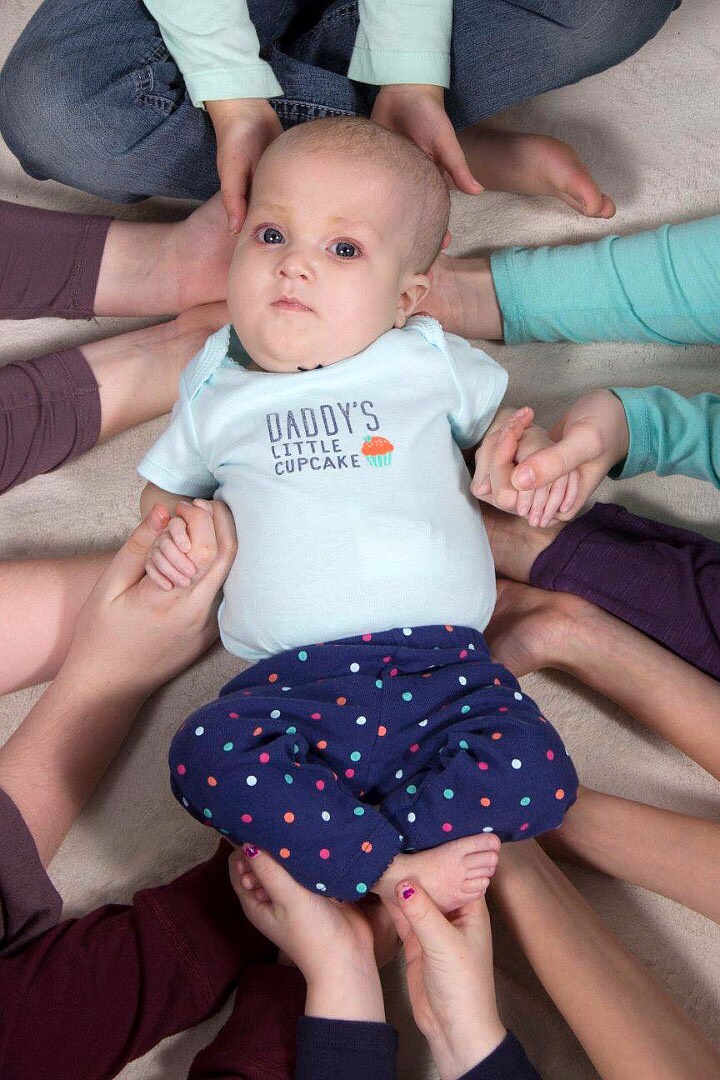Claire Helms is a wife, mother and family practice nurse who lives in Louisiana. Her daughter Presley died of Zellweger syndrome in May 2016, a day shy of 11-months old. Like any parent who experiences the death of a child, the memories are etched into her brain — her daughter’s initial diagnosis at 5 months; Claire’s disbelief and the questions that followed; appointments with specialists; hospital visits; and her precious time with Presley, who she worked so hard to protect every step of the way.

From learning about Presley’s diagnosis to managing her daughter’s hospice care and end of life plan, the experience is one Claire will always carry with her. And while the memories can be difficult, her knowledge as a nurse, parent and caregiver are a gift to others living a similar story. Below she shares some helpful tips on how best to work with doctors and hospice care.1. Write down your questions before your visit and share information.
Claire says nothing can prepare a parent for the news of a fatal diagnosis. Emotions take over, and it’s easy to forget what you want to say. When it comes time to revisit the doctor, come armed with questions, no matter how trivial they may seem. After learning Presley had Zellweger syndrome, Claire later called her doctor’s office and asked, “How do you spell the name of this genetic disorder?” Once she knew, Claire read articles about the syndrome and returned to Presley’s follow-up appointments with two pages questions. She asked Presley’s doctors to answer each and every one.
Prior to that first appointment, Claire also printed several copies of treatment guidelines available on thegfpd.org. While Presley’s neurologist and geneticist were familiar with Zellweger syndrome, many of her doctors had never heard of the genetic disorder before. Claire gave the guidelines to every doctor Presley visited, and she says the information helped her physicians know what symptoms to watch for and what medications worked best. “You won’t offend your doctors by offering this information,” Claire says. “You’re advocating for your child.”
2. Bring a notebook to every appointment.
When you write down your son or daughter’s daily experiences, it helps you keep focused during the toughest times. Claire kept track of Presley’s seizures, as well as any new symptoms that arose. If she noticed something new or different about her daughter, she wrote that down, too. By doing so, the doctors had an accurate timeline of Presley’s symptoms. Claire’s notes also helped doctors come up with focused treatment plans.
3. Keep a medicine chart (in pencil).
In your notebook, write down the names of each medication, the dose and the frequency of each dose in pencil. This way, if there are updates, you can easily erase the old information on your chart and replace it with the latest medications. Bring this chart to each appointment, so that every doctor is aware of what your child is currently taking.
4. Don’t be afraid to speak up.
“Remember that you are your child’s biggest advocate,” Claire says. ”You know what they can and cannot handle, so if a nurse tries to stick an IV in multiple times and you want her to stop, tell her to stop. Similarly, if a doctor is speaking in medical jargon you don’t understand, tell that doctor to use layman’s terms instead. At the end of the day, you and your doctors are a team. Your input is important to them.”
5. Watch, assist, then perform.
When it comes to specific medical procedures, such as hooking up your child’s G-Tube, Claire recommends asking the hospital nurses or staff to repeat the process several times. “In nursing school when we learned a new skill, we always said: watch; assist; then perform. Watch the nurse or doctor carry out the procedure, assist them, and then have them give you feedback when you try it for yourself.”
6. Create a plan for hospice and let the nurses help.
While it’s heartbreaking to put your child in hospice care, Claire says having a plan in place was helpful in Presley’s final weeks. Claire and her family had to discuss and make decisions on the unthinkable—whether or not to sign a DNR (do not resuscitate), choosing between a cremation or funeral, and if they wanted a family-only service or a public one. “When hospice knows what you want in advance,” she says, “they can take care of everything when the time comes.”
With the help of the hospice nurses, who she calls “a gift from God,” Claire was able to de-stress and recoup during these difficult days by simply having the time to walk outside or pull weeds in her garden. Her best advice is to let the hospice staff do their job. “It was especially hard for me to let go because I’m a nurse and mother. I didn’t want anyone else doing for my child what I could do myself, but I finally said okay.”
The decision to let the nurses help care for Presley was a turning point for Claire. She realized that giving herself the time she needed, made it possible for her to keep going. “If you aren’t taking care of yourself,” she says, “then you can’t take care of your child.”
